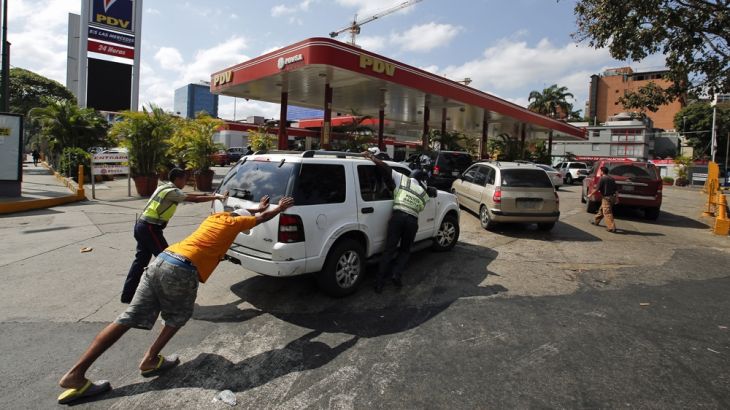Venezuela: Where’s the petrol?
Venezuela has the world’s largest oil reserves, yet people are scrambling to fill car tanks as petrol supplies dry up.

For the last five years, Venezuelans have been struggling to live with an increasing shortage of food, medicine, electricity and water.
An unprecedented economic crisis and, more recently, the severe US economic sanctions aimed at forcing out President Nicolas Maduro have paralysed public service.
Keep reading
list of 4 itemsParallel economy: How Russia is defying the West’s boycott
US House approves aid package worth billions for Ukraine, Israel
Ecuador weighs security, international arbitration in latest referendum
With hyperinflation running at over one million percent and counting, feeding a family on an average salary has become almost impossible.
One of the very few things that Venezuelans could afford was petrol because it literally cost nothing. A litre of petrol cost $0.000001. But now, even filling one’s car with the fuel has suddenly become an uphill battle for millions of Venezuelans.
Just two hours northwest of the capital, Caracas, you get the first glimpse of a crisis that is spreading.
In the state of Aragua, thousands of car owners spent Sunday in queues that were kilometres long.
“I was in the line yesterday for four hours and did not get a drop. I hope I’ll be luckier today,” said Leonardo Lopez as he waited in the heat for the queue to inch forward.
He pulled out his mobile phone to show that he and his friends had a group chat called ‘Aragua Where Is The Gasoline’ so they let each other know which petrol station still had fuel to sell.
‘Collective catastrophe’
Further west, the shortages are more acute, especially in the states of Carabobo and even Zulia, which is supposed to be Venezuela‘s oil capital.
And in the border state of Tachira, where for months residents have been queueing for days to fill up their car tanks.
“The shortages are now collective catastrophe,” according to State Governor Laidy Gomez.
“The losses are incalculable to the agriculture sector; paralysed and the limitations for mobilising health emergencies are generating crimes against humanity,” she said on Twitter on Saturday.
![Venezuela's oil industry accounts for more than 90 percent of its exports [Isaac Urrutia/Reuters]](/wp-content/uploads/2019/05/32fb8ab7f09d4e638cd649aeb4e74080_18.jpeg)
Carabobo Governor Rafael Lacava appealed to motorists to remain calm and not let “media chaos laboratories” make them nervous.
Harsh US economic sanctions that have specifically targeted Venezuela’s vital oil industry are punishing the already decrepit state-owned petroleum and natural petrol company, PDVSA.
“We are refining at only 20 percent of our installed capacity. In other words, our maximum capacity is 1.3 million barrels a day, but we are only managing to refine 260,000 barrels,” said Alfredo Quiroz, an oil industry expert.
“That is not enough for Venezuela’s five million vehicles. So that means we are having to import gasoline [petrol] to make up for the shortfall.”
‘Bigger problem’
Until now, Venezuela had been buying petrol from the US. But as of April 28, US government sanctions forbidding fuel sales to PDVSA kicked in.
According to Quiroz, the government has signed a 90-day contract to buy petrol from Spain’s oil company REPSOL, in exchange for oil, which for now is being provided by Russia’s energy giant ROSNEFT.
“But we have another bigger problem,” said Quiroz. “The US will no longer sell Venezuela the additives needed to make gasoline at home and they are much harder to find on the world market.
“Mexico’s PEMEX does not have any for sale. Most other companies have already committed their additives too.”
The additives are chemical derivatives of oil, which Venezuela used to produce in abundance. But while the country boasts the world’s largest oil reserves, its state-owned industry is in decay. Most of the plants that used to make the components are paralysed.
![The shortages are more acute in the states of Carabobo and Zulia [Carlos Eduardo Ramirez/Reuters]](/wp-content/uploads/2019/05/85a7d300e9074fa9a7e4099996bdbc46_18.jpeg)
The refineries need constant maintenance and some have not received it for years, according to industry insiders.
Venezuela’s lifeline is its oil industry, which accounts for more than 90 percent of the country’s export earnings.
For the last 20 years, PDVSA’s production has been steadily declining from 3.36 million barrels a day in 1998 to approximately 727,000 barrels now.
While the price of its heavy crude was at nearly $100 a barrel, the effect was not so easily perceived. But when it fell to less than $50 a barrel in 2013, Venezuela’s economy quickly began to crash.
Maduro claims that the subsequent hyperinflation, widespread shortages of basic goods and general collapse of the economy are the fallout from an economic war waged by his domestic and foreign enemies, mainly the US.
Opinion polls suggest the majority of Venezuelans blame his government for incompetence and widespread corruption.
The reasons may be the subject of heated debate, but what no one can question is that the current fuel shortage adds yet another layer to the already heavy burden of living in Venezuela.